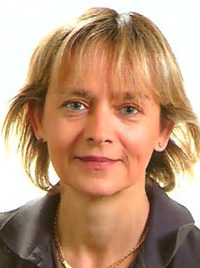Go to
Donatella Sciuto
Position statement:
Today’s “hyperconnected world” has allowed every individual to develop content, distribute it anywhere and collaborate with anyone. Prepare graduates to succeed in this highly competitive environment requires a rethinking of high-level education and in particular a necessary role of ICT in all fields of study. To take a successful position in the job market it must be remembered that what is important today is not what you know but what you can do with what you know. This implies that together with a deep understanding of the specific area of competence, university education must be able to transfer to the students the attitude to innovation, the expression of creativity coupled with cultural understanding. In the end, this means preparing students to be able to approach complex problems with critical analysis and flexibility, being able to identify interdisciplinary solutions, without fear of thinking out of the box. Today, many solutions require ICT as the key enabling technology, making ICT a core competence for all students.
The fast changing world, with its increased uncertainty, requires universities to be an observatory, able to adapt their research and education directions with the emerging needs of the society, to be integrated in their core competence roots that must be nurtured to enable progress in knowledge.
The way we shape the future of our universities research and education will also shape the future of society.
About the panel member:
 Donatella Sciuto is Vice Rector of Politecnico di Milano and full professor in Computer Engineering at the Dipartimento di Elettronica, Informazione e Bioingegneria. She is a member of the Consiglio Superiore (Board of Governors) of the Bank of Italy. She received her degree in Electronic Engineering from the Politecnico di Milano, her PhD in Electrical and Computer Engineering from the University of Colorado, Boulder and a Master in Business and Administration from SDA Bocconi University.
Donatella Sciuto is Vice Rector of Politecnico di Milano and full professor in Computer Engineering at the Dipartimento di Elettronica, Informazione e Bioingegneria. She is a member of the Consiglio Superiore (Board of Governors) of the Bank of Italy. She received her degree in Electronic Engineering from the Politecnico di Milano, her PhD in Electrical and Computer Engineering from the University of Colorado, Boulder and a Master in Business and Administration from SDA Bocconi University.
Her main research interests cover the methodologies for the design of embedded systems and multicore systems, from the specification level down to the implementation of both the hardware and software components, including reconfigurable and adaptive systems. She has published over 250 research papers. She is a Fellow of IEEE and has been President of the IEEE Council of Electronic Design Automation until 2013.
She has been associate editor of the IEEE Transactions on Computers, and she is Associate editor of the Journal of Design Automation of Embedded Systems, Kluwer Academic Publishers and of the IEEE Embedded Systems Letters. She is or has been member of different program committees of electronic design automation conferences, among which: DAC, ICCAD, DATE, CODES+ISSS, CASES, DFT, FDL, PATMOS, IFIP VLSI Conference.
She is in the executive committee of the conference IEEE/ACM Design Automation and Test in Europe, for which she has been Program Chair in 2006 and General Chair in 2008. She has been General Co-Chair of ESWEEK in 2009 and 2010. She has been Program Co-Chair for the IEEE/ACM Design Automation Conference in 2012 and 2013. She is in the main board of the European Design Automation Association. She has coordinated and coordinates different European and National research projects. She is an expert member of the Ministry of Research and University (MIUR) in the evaluation of research and innovation projects.
Secondary navigation
- EPFL Workshop on Logic Synthesis and Emerging Technologies
- Luca Amaru
- Luca Benini
- Giovanni De Micheli
- Srini Devadas
- Antun Domic
- Rolf Drechsler
- Pierre-Emmanuel Gaillardon
- Jie-Hong Roland Jiang
- Akash Kumar
- Shahar Kvatinsky
- Yusuf Leblebici
- Shin-ichi Minato
- Alan Mishchenko
- Vijaykrishnan Narayanan
- Ian O'Connor
- Andre Inacio Reis
- Martin Roetteler
- Julien Ryckaert
- Mathias Soeken
- Christof Teuscher
- Zhiru Zhang
- Symposium on Emerging Trends in Computing
- Layout synthesis: A golden DA topic
- EPFL Workshop on Logic Synthesis & Verification
- Luca Amaru
- Luca Benini
- Robert Brayton
- Maciej Ciesielski
- Valentina Ciriani
- Jovanka Ciric-Vujkovic
- Jason Cong
- Jordi Cortadella
- Giovanni De Micheli
- Antun Domic
- Rolf Drechsler
- Henri Fraisse
- Paolo Ienne
- Viktor Kuncak
- Enrico Macii
- Igor Markov
- Steven M. Nowick
- Tsutomu Sasao
- Alena Simalatsar
- Leon Stok
- Dirk Stroobandt
- Tiziano Villa
- Symposium on Emerging Trends in Electronics
- Raul Camposano
- Anantha Chandrakasan
- Jo De Boeck
- Gerhard Fettweis
- Steve Furber
- Philippe Magarshack
- Takayasu Sakurai
- Alberto Sangiovanni-Vincentelli
- Ken Shepard
- VENUE
- Panel on Circuits in Emerging Nanotechnologies
- Panel on Emerging Methods of Computing
- Panel on The Role of Universities in the Emerging ICT World
- Panel on Design Challenges Ahead
- Panel on Alternative Use of Silicon
- Nano-Bio Technologies for Lab-on-Chip
- Functionality-Enhanced Devices Workshop
- More Moore: Designing Ultra-Complex System-on-Chips
- Design Technologies for a New Era
- Nanotechnology for Health
- Secure Systems Design
- Surface Treatments and Biochip Sensors
- Security/Privacy of IMDs
- Nanosystem Design and Variability
- Past Events Archive
